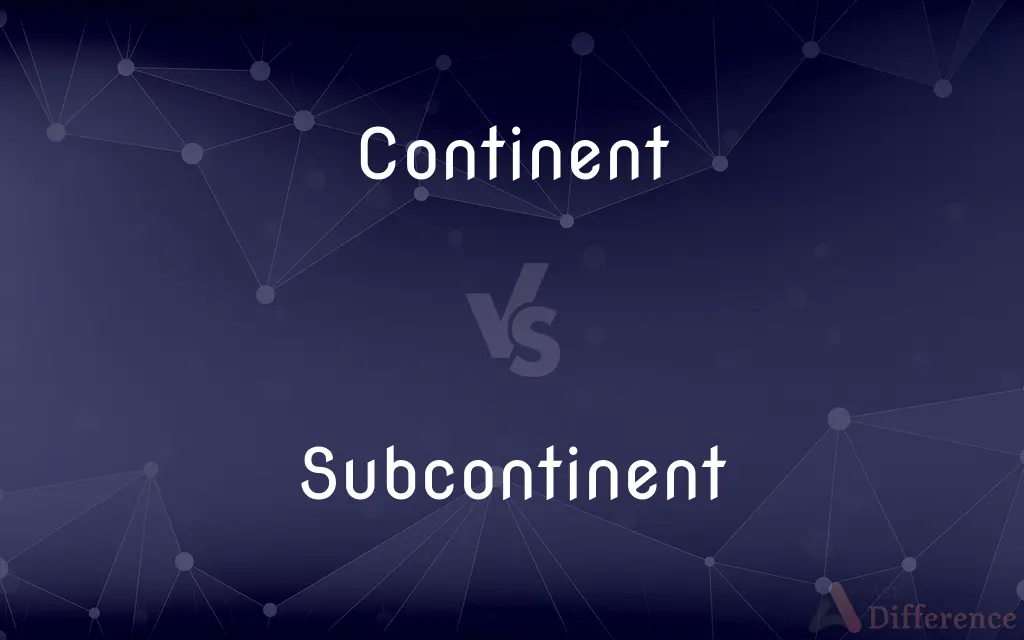Continent vs. Subcontinent — What's the Difference?
Edited by Tayyaba Rehman — By Fiza Rafique — Updated on October 5, 2023
A "continent" is a large continuous landmass, while a "subcontinent" is a sizable portion of a continent distinguished by geographical, cultural, or political factors.

Difference Between Continent and Subcontinent
Table of Contents
ADVERTISEMENT
Key Differences
A "continent" is one of Earth's primary landmasses, generally separated by oceans. Examples include Africa, Asia, and Europe. In contrast, a "subcontinent" is a large, distinct part of a continent, often separated by physical features like mountains, and may have unique cultural or political attributes. The Indian subcontinent is a notable example.
Continents represent the larger scale, encompassing vast expanses of land and housing diverse ecosystems, countries, and cultures. Subcontinents, while still substantial in size, are smaller in comparison and typically represent a distinct portion of a continent.
While continents are primarily defined by their geological and geographical attributes, subcontinents often have defining characteristics that might be geographical, cultural, or historical. For instance, the Indian subcontinent is defined both by the Himalayan mountain range and shared historical and cultural ties among its countries.
There are traditionally seven recognized continents on Earth. Subcontinents, on the other hand, are less formally categorized, and their recognition can be based on various factors, including geographical, cultural, or political considerations.
In discussions of global geography, continents serve as broad categorizations of the Earth's landmass. Subcontinents offer a more nuanced perspective, highlighting specific regions within these vast expanses that have distinct identities or characteristics.
ADVERTISEMENT
Comparison Chart
Definition
A large continuous landmass.
A sizable, distinct part of a continent.
Scale
Larger, primary divisions of land on Earth.
Smaller than continents but still significant.
Characteristics
Defined mainly by geography.
Defined by geography, culture, or politics.
Examples
Asia, Africa, North America.
Indian subcontinent, Arabian subcontinent.
Significance
Represents broad categorizations of the Earth's land.
Offers a more nuanced understanding of specific regions.
Compare with Definitions
Continent
A primary division of land on Earth separated by oceans.
Asia is the largest continent by both area and population.
Subcontinent
A region with unique geographical or cultural features within a continent.
The Arabian subcontinent is characterized by its vast deserts.
Continent
The planet's principal terrestrial habitats.
The continent of Africa boasts a rich diversity of ecosystems.
Subcontinent
A sizable landmass smaller than a continent but bigger than a country.
The Iberian subcontinent comprises mainly Spain and Portugal.
Continent
A vast continuous landmass.
Antarctica is a continent almost entirely covered by ice.
Subcontinent
A distinct, large part of a continent.
The Indian subcontinent includes several countries like India, Pakistan, and Bangladesh.
Continent
One of the Earth's main land areas.
Europe and Asia are sometimes referred to as a single continent called Eurasia.
Subcontinent
A portion of a continent separated by distinct geographical features.
The Himalayas play a significant role in defining the Indian subcontinent.
Continent
Large expanses of land distinct from islands.
Australia is both a country and a continent.
Subcontinent
A secondary division of a continent based on various factors.
South Asia, often referred to as the Indian subcontinent, has shared historical ties.
Continent
A continent is one of several large landmasses. Generally identified by convention rather than any strict criteria, up to seven regions are commonly regarded as continents.
Subcontinent
A large landmass, such as India, that is part of a continent but is considered either geographically or politically as an independent entity.
Continent
One of the principal land masses of the earth, usually regarded as including Africa, Antarctica, Asia, Australia, Europe, North America, and South America.
Subcontinent
A large landmass, such as Greenland, that is smaller than a continent.
Continent
Continent The mainland of Europe. Used with the.
Subcontinent
A large landmass which is either smaller than a continent (such as Greenland), or part of an even larger continent (such as the Indian subcontinent).
Continent
Exercising continence.
Subcontinent
The Indian subcontinent, South Asia.
Continent
Each of the main continuous land-masses on the earth's surface, now generally regarded as seven in number, including their related islands, continental shelves etc.
Subcontinent
A large and distinctive landmass (as India or Greenland) that is a distinct part of some continent
Continent
A large contiguous landmass considered independent of its islands, peninsulas etc. Specifically, the Old World continent of Europe–Asia–Africa. See the Continent.
Continent
(obsolete) Land (as opposed to the water).
Continent
Exercising self-restraint; controlled, temperate with respect to one's bodily needs or passions, especially sex, urination and/or defecation.
Continent
Not interrupted; connected; continuous.
A continent fever
Continent
(obsolete) Serving to restrain or limit; restraining; opposing.
Continent
Serving to restrain or limit; restraining; opposing.
Continent
Exercising restraint as to the indulgence of desires or passions; temperate; moderate.
Have a continent forbearance till the speed of his rage goes slower.
Continent
Abstaining from sexual intercourse; exercising restraint upon the sexual appetite; esp., abstaining from illicit sexual intercourse; chaste.
My past life
Hath been as continent, as chaste, as true,
As I am now unhappy.
Continent
Not interrupted; connected; continuous; as, a continent fever.
The northeast part of Asia is, if not continent with the west side of America, yet certainly it is the least disoined by sea of all that coast.
Continent
That which contains anything; a receptacle.
The smaller continent which we call a pipkin.
Continent
One of the grand divisions of land on the globe; the main land; specifically (Phys. Geog.), a large body of land differing from an island, not merely in its size, but in its structure, which is that of a large basin bordered by mountain chains; as, the continent of North America.
Continent
One of the large landmasses of the earth;
There are seven continents
Pioneers had to cross the continent on foot
Continent
The European mainland;
Englishmen like to visit the Continent but they wouldn't like to live there
Continent
Having control over urination and defecation
Continent
Abstaining from sexual intercourse;
Celibate priests
Common Curiosities
What defines the boundaries of a subcontinent?
It can be geographical features, cultural ties, or political distinctions.
What's the most populous subcontinent?
The Indian subcontinent is the most populous, including countries like India, Pakistan, and Bangladesh.
How many continents are there?
Traditionally, there are seven continents: Africa, Antarctica, Asia, Europe, North America, Australia, and South America.
Is Australia a continent or subcontinent?
Australia is considered a continent.
Is the term "subcontinent" used officially in geography?
While used commonly, "subcontinent" is less formal than "continent" and can be based on various factors.
Can a subcontinent comprise a single country?
Yes, for example, the Indian subcontinent is often equated with India, though it includes other countries.
Do all continents have subcontinents?
No, the designation of subcontinents is not universally applied across all continents.
Is Greenland a continent or subcontinent?
Greenland is an island and not considered a continent or subcontinent.
Are continents separated only by oceans?
Generally, yes, though there are exceptions like the boundary between Europe and Asia.
Which continent has the most countries?
Africa, with 54 recognized countries.
Are there other subcontinents besides the Indian subcontinent?
Yes, examples include the Arabian and Iberian subcontinents.
Why is Europe and Asia considered two continents?
This division is historical and cultural, though they share a continuous landmass.
Which continent is the smallest?
Australia.
How are continents and subcontinents relevant today?
They help in understanding global geography, cultural regions, and historical ties.
Can a region become recognized as a subcontinent over time?
Recognition of a subcontinent can change based on cultural, political, or geographical shifts.
Share Your Discovery

Previous Comparison
Pollutant vs. Pollution
Next Comparison
Secretary vs. ReceptionistAuthor Spotlight
Written by
Fiza RafiqueFiza Rafique is a skilled content writer at AskDifference.com, where she meticulously refines and enhances written pieces. Drawing from her vast editorial expertise, Fiza ensures clarity, accuracy, and precision in every article. Passionate about language, she continually seeks to elevate the quality of content for readers worldwide.
Edited by
Tayyaba RehmanTayyaba Rehman is a distinguished writer, currently serving as a primary contributor to askdifference.com. As a researcher in semantics and etymology, Tayyaba's passion for the complexity of languages and their distinctions has found a perfect home on the platform. Tayyaba delves into the intricacies of language, distinguishing between commonly confused words and phrases, thereby providing clarity for readers worldwide.















































